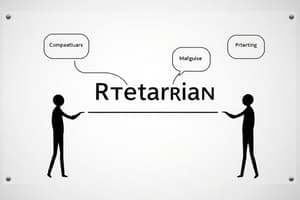Podcast
Questions and Answers
What is the primary focus of the Rhetorical Perspective?
What is the primary focus of the Rhetorical Perspective?
- The historical context of the argument
- The speaker's personal beliefs and experiences
- The appeal to the audience's needs and interests (correct)
- The use of complex vocabulary
Which of the following is NOT one of the three key tools of persuasion in rhetoric?
Which of the following is NOT one of the three key tools of persuasion in rhetoric?
- Mythos (correct)
- Pathos
- Logos
- Ethos
What does 'logos' refer to in the context of rhetorical appeals?
What does 'logos' refer to in the context of rhetorical appeals?
- Ethical appeal
- Cultural appeal
- Emotional appeal
- Logical appeal (correct)
How does pathos function in persuasive communication?
How does pathos function in persuasive communication?
What does 'ethos' primarily concern in rhetoric?
What does 'ethos' primarily concern in rhetoric?
Who founded the Lyceum, an important school of rhetoric?
Who founded the Lyceum, an important school of rhetoric?
The Narrative Paradigm suggests that our lives are shaped by which of the following?
The Narrative Paradigm suggests that our lives are shaped by which of the following?
In the study of communication, what term describes a student or teacher of rhetoric?
In the study of communication, what term describes a student or teacher of rhetoric?
What does narrative probability assess in a story?
What does narrative probability assess in a story?
Which persuasion principle involves inducing compliance through rewards and punishments?
Which persuasion principle involves inducing compliance through rewards and punishments?
What characterizes a story that exhibits narrative fidelity?
What characterizes a story that exhibits narrative fidelity?
Which method of persuasion is best described as integrating an argument into one's cognitive system?
Which method of persuasion is best described as integrating an argument into one's cognitive system?
What aspect of credibility relies on the speaker's background knowledge relevant to the subject?
What aspect of credibility relies on the speaker's background knowledge relevant to the subject?
Which of the following best describes trustworthiness in an argument?
Which of the following best describes trustworthiness in an argument?
Identification as a persuasion principle primarily depends on which factor?
Identification as a persuasion principle primarily depends on which factor?
Which factor is least likely to influence narrative fidelity?
Which factor is least likely to influence narrative fidelity?
What does the term dynamism refer to in the context of argumentation?
What does the term dynamism refer to in the context of argumentation?
Which of the following actions helps to enhance credibility in an argument?
Which of the following actions helps to enhance credibility in an argument?
What is a primary way to lose credibility during an argument?
What is a primary way to lose credibility during an argument?
What is reluctant testimony?
What is reluctant testimony?
Which method of persuasion is viewed as unethical and often distracting?
Which method of persuasion is viewed as unethical and often distracting?
Transitivity arguments are constructed based on which logical form?
Transitivity arguments are constructed based on which logical form?
What is one method that can diminish an arguers’ ethos?
What is one method that can diminish an arguers’ ethos?
What is considered a sound way to maintain credibility while presenting an argument?
What is considered a sound way to maintain credibility while presenting an argument?
In reasoning by analogy, which type involves comparing objects of different classes?
In reasoning by analogy, which type involves comparing objects of different classes?
What is the relationship expressed in a reciprocal argument?
What is the relationship expressed in a reciprocal argument?
Which statement correctly describes reasoning by generalization?
Which statement correctly describes reasoning by generalization?
What conclusion can be drawn from a disjunctive syllogism?
What conclusion can be drawn from a disjunctive syllogism?
Which of the following best exemplifies reasoning by example?
Which of the following best exemplifies reasoning by example?
In the context of reasoning, what is a key feature of a figurative analogy?
In the context of reasoning, what is a key feature of a figurative analogy?
Which scenario best illustrates reasoning by analogy?
Which scenario best illustrates reasoning by analogy?
What does the major premise in a disjunctive syllogism represent?
What does the major premise in a disjunctive syllogism represent?
What defines a necessary condition in causal reasoning?
What defines a necessary condition in causal reasoning?
Which of the following best illustrates a sufficient condition?
Which of the following best illustrates a sufficient condition?
What is the role of a causal argument?
What is the role of a causal argument?
How does a coexistential argument function?
How does a coexistential argument function?
What differentiates dissociation arguments from other forms of reasoning?
What differentiates dissociation arguments from other forms of reasoning?
Which example best represents an argument from authority?
Which example best represents an argument from authority?
In the example, 'Throwing gasoline on a fire will cause an explosion', what type of reasoning is being illustrated?
In the example, 'Throwing gasoline on a fire will cause an explosion', what type of reasoning is being illustrated?
What common misconception does correlation often lead to?
What common misconception does correlation often lead to?
Flashcards
Rhetorical Perspective
Rhetorical Perspective
This approach views arguments as appeals to an audience, considering the circumstances and strategies used to influence them.
Logos
Logos
The logical dimension of an appeal, emphasizing reason and evidence.
Pathos
Pathos
The emotional dimension of an appeal, aiming to evoke feelings and connect with the audience's values.
Ethos
Ethos
Signup and view all the flashcards
Narrative Paradigm
Narrative Paradigm
Signup and view all the flashcards
Aristotle
Aristotle
Signup and view all the flashcards
Rhetorician
Rhetorician
Signup and view all the flashcards
Persuasion in Rhetoric
Persuasion in Rhetoric
Signup and view all the flashcards
Narrative Probability
Narrative Probability
Signup and view all the flashcards
Narrative Fidelity
Narrative Fidelity
Signup and view all the flashcards
Compliance (Persuasion)
Compliance (Persuasion)
Signup and view all the flashcards
Identification (Persuasion)
Identification (Persuasion)
Signup and view all the flashcards
Internalization (Persuasion)
Internalization (Persuasion)
Signup and view all the flashcards
Expertise (Ethos)
Expertise (Ethos)
Signup and view all the flashcards
Trustworthiness (Ethos)
Trustworthiness (Ethos)
Signup and view all the flashcards
Dynamism in Argumentation
Dynamism in Argumentation
Signup and view all the flashcards
Establishing Credibility (Ethos)
Establishing Credibility (Ethos)
Signup and view all the flashcards
Using Qualified Sources
Using Qualified Sources
Signup and view all the flashcards
Reluctant Testimony
Reluctant Testimony
Signup and view all the flashcards
Lying by Commission
Lying by Commission
Signup and view all the flashcards
Lying by Omission
Lying by Omission
Signup and view all the flashcards
Manipulation in Argumentation
Manipulation in Argumentation
Signup and view all the flashcards
Coercion in Argumentation
Coercion in Argumentation
Signup and view all the flashcards
Incompatibilities
Incompatibilities
Signup and view all the flashcards
Reciprocals
Reciprocals
Signup and view all the flashcards
Literal Analogy
Literal Analogy
Signup and view all the flashcards
Figurative Analogy
Figurative Analogy
Signup and view all the flashcards
Reasoning by Generalization
Reasoning by Generalization
Signup and view all the flashcards
Reasoning by Example
Reasoning by Example
Signup and view all the flashcards
Reasoning by Analogy (Overall)
Reasoning by Analogy (Overall)
Signup and view all the flashcards
The Testing Effect
The Testing Effect
Signup and view all the flashcards
Necessary Condition
Necessary Condition
Signup and view all the flashcards
Sufficient Condition
Sufficient Condition
Signup and view all the flashcards
Causal Argument
Causal Argument
Signup and view all the flashcards
Coexistential Argument
Coexistential Argument
Signup and view all the flashcards
Argument from Authority
Argument from Authority
Signup and view all the flashcards
Dissociation Argument
Dissociation Argument
Signup and view all the flashcards
Correlation vs. Causation
Correlation vs. Causation
Signup and view all the flashcards
Hierarchal Language
Hierarchal Language
Signup and view all the flashcards
Study Notes
COM 203: Argument & Analysis
- This course covers argument and analysis.
Chapter 10: The Rhetorical Perspective
-
Arguments are seen as appeals to an audience.
-
Consider the circumstances and strategies used to influence the audience.
-
Focuses on addressing recipient needs and interests to persuade.
-
Arguments should be relevant and persuasive.
-
The rhetorical perspective traces back to Aristotle (384-322 BCE).
-
Aristotle was a Greek philosopher who wrote about communication.
-
Aristotle was a student of Plato.
-
Aristotle founded the Lyceum, a famous school of rhetoric.
-
Rhetoric is the Greek name for the study of communication.
-
Rhetoric focuses on effective persuasion.
-
A rhetorician is a student or teacher of rhetoric.
-
Persuasion of audiences can be achieved using three tools.
- Logos: logical dimension of appeal ("Word")
- Pathos: emotional dimension of appeal ("Suffering" or "Sensation")
- Ethos: speaker's credibility ("Character")
Chapter 10: Persuading Your Audience (Pathos)
-
The Narrative Paradigm suggests we experience life through narratives (stories/ events).
-
Stories shape our understanding of the world, beliefs, and values.
-
Stories teach about history, ethics, and cultural/personal codes.
-
Types of historical narratives used for pathos.
- Historical narratives
- Myths/legends/parables
- Anecdotes
-
Narratives are assessed via:
- Narrative Probability: Does the story make sense?
- Narrative Fidelity: Does the story match our values, experiences and reality?
Chapter 10: Persuasion Principles
-
Compelling audience agreement is possible via three ways.
- Compliance: Using rewards/punishments from a powerful source (independent of argument).
- Identification: Attractive source, enhances self-concept.
- Internalization: integrating the argument into one's cognitive system (persists despite losing the source).
-
Credibility (Ethos)
- Expertise: Knowledge/information relevant to the argument.
- Trustworthiness: Motivated to tell the truth.
- Dynamism: Strong delivery, impression that the arguer cares.
Chapter 10: Enhancing Credibility
- Show audience experience (yours/sources).
- Use qualified sources.
- Use sources your recipients respect.
- Use sound reasoning.
- Demonstrate fairness.
- Use reluctant testimony (source against vested interest).
- Avoid inconsistency.
Chapter 10: Ways to Lose Credibility
- Lying.
- Lying by commission: making untrue statements.
- Lying by omission: not acknowledging damaging facts.
- Manipulation: Deliberate misrepresentation of facts/evidence.
- Coercion: Use of force/threats to do something against one's will.
Chapter 10: Caveats
- Using only emotional appeals is generally distracting and unethical
Chapter 6: Reasoning Categories (Logos Revisited)
- Reasoning via quasilogical arguments.
- Quasilogical arguments relate two or three elements to indicate a connection, similar to syllogisms.
- Similar to hypothetical/categorical syllogisms.
Chapter 6: Other Types of Reasoning
- Transivity arguments
- Incompatibilities
- Reciprocities
- Reasoning by analogy: literal or figurative comparison of objects.
- Reasoning by generalization / example: generalizing from a concrete example
Chapter 6: Reasoning by Cause
-
Causal Arguments: claim that that one condition/event contributes to or brings about another condition/event.
-
Necessary condition: One must be present for the other to occur.
-
Sufficient condition: Presence guarantees the event.
Chapter 6: Reasoning via Coexistential Arguments
- Reason from an observed sign or condition to an unobserved feature.
Chapter 6: Argument from Authority
- An argument that reasons that a statement by a knowledgeable person can serve as sufficient evidence.
Chapter 6: Dissociation
- Disengages one idea from another, seeking new evaluation of both.
- Values the real over subjective, and permanent over temporary.
Studying That Suits You
Use AI to generate personalized quizzes and flashcards to suit your learning preferences.




